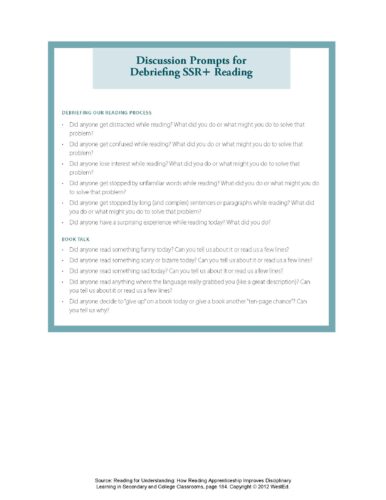These discussion prompts can be used for whole class debriefing of SSR+ reading. Once they are familiar with the prompts, it can be helpful to give a copy to students for their use in debriefing with a partner.
SSR+ Metacognitive Log Template
This version of the metacognitive log can be used to work with students around sustained silent reading (SSR+). Typically, students record data about reading time and pages completed as well as their observations about their reading behavior. Some like to include a graph that allows them to chart their progress in reading time and pages completed.
This PDF consists of two pages, with two versions of the log template: one page that includes context for teachers, and one that is blank for student use.
A Metacognitive Funnel
For many teachers and students, the metaphor of a “metacognitive funnel” helps them think about and talk about the ways readers’ attention may shift as they read any given text. This resource shows these different areas of attention and gives examples of representative metacognitive statements that apply to each. The goal for readers is to be able to intentionally and strategically focus their attention in ways that will help them accomplish their reading purposes.
This PDF consists of two pages, with two versions of the framework: one that is filled in, and one that is blank for student use.
Metacognitive Reading Log: Pair Work
To deepen the metacognative conversation, teachers can have their students work in pairs to review and discuss their Metacognative Reading Log Graphic Organizers.
Metacognitive Reading Log Template
When students keep metacognitive reading logs in a loose-leaf binder or electronically, the individual sheets or documents can easily be turned in for teacher assessment, as with this Metacognative Reading Log Graphic Organizer. The log entries allow the teacher to see what students are understanding, curious about, or confused by—and respond accordingly.
This document can be printed for students to use hard copies or can be used electronically via fillable text fields.
Metacognitive Bookmark
When teachers model metacognitive conversation with a Think Aloud, many give students a bookmark for keeping track of the common kinds of thinking processes the teacher will be demonstrating. Students can use this same bookmark as a scaffold for their own metacognitive conversations when practicing with a partner.

